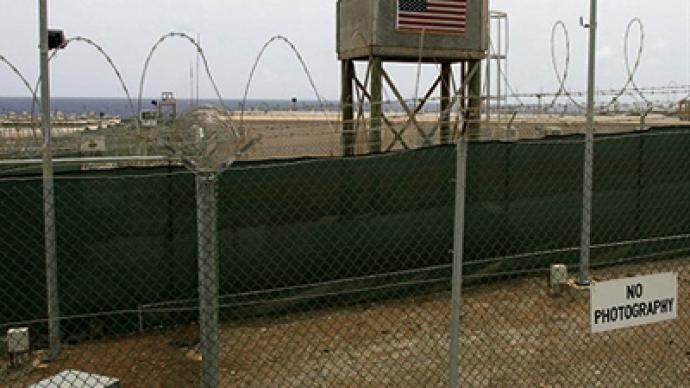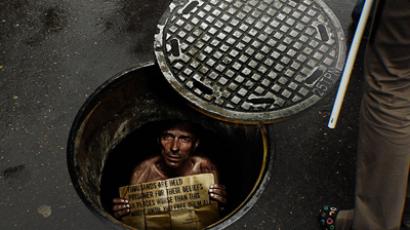US Guantanamo lease with Cuba remains in dispute

It’s a place forever immortalized by images of torture. Known by its abbreviation GTMO, America’s notorious detention facility in Guantanamo Bay, Cuba enters its 10th year.
The facility has also been the subject of contention between the US and Cuba. Cuban authorities argue the 45 square mile military base violates Cuban sovereignty and amounts to a military occupation.Author and journalist Robert Naiman pointed to the initial treaty which granted the US government lease rights over Cuban territory.“The agreement under which the US government has a base on Cuban soil, the GTMO military base, dates from the early years of the 20th century,” Naiman said. The agreement was known as the Platt Amendment, initiated in 1903 after the Spanish-American War.However, the terms in which the US government acquired the treaty have always been in question. Naiman argued the treaty was “extracted from the then Cuban government under threat, under duress.”The terms of the treaty are in violation of the Vienna Laws on Treaty Conventions.The US government threatened to continue its occupation of Cuba unless the Cuban authorities agreed to lease the land for America’s military base indefinitely, or for as long as it paid the Cubans its yearly rent, which is $4,083 dollars. After the Cuban Revolution swept the island nation in 1960, its revolutionary leader Fidel Castro cashed only one check, and he insists, it was by accident. The Cuban government has never cashed a check since in protest of the treaty. Although the base is under US jurisdiction, it’s on Cuban soil, which has enraged Castro for decades. The Cuban leader has demanded the US government return Cuba’s land and renegotiate the treaty.“No such treaty would ever be signed today, no such treaty signed today would ever be recognized today,” said Naiman. After 9/11, the Bush administration quickly turned its military base into a detention facility. Declassified documents show the US government used Cuban soil to evade national and international law to interrogate terror suspects.It’s a strategy Journalist Pepe Escobar argued is convenient for the US. “You can ship them to Cuba, never bring them to the U.S. mainland, and they are going to live there forever in a state of legal limbo.”Most of the remaining 173 prisoners at GTMO have been detained there since the facility opened nine years ago, awaiting a trial. President Obama recently signed away his right to bring detainees to US soil making it unlikely that most detainees will see a trail or justice during Obama’s term. Foreign policy analysts suggest the US has been violating Cuba’s sovereignty for one reason:“Because this is the only Latin American country over these past 50 years that has said ‘damn you’ straight to the eye of the American government or as they would say, the American empire,” said Escobar. An old dispute making waves in a new century as a fortress for the United States to withhold prisoners’ legal rights and the land of its rightful owner.Andy Worthington, author of "The Guantanamo Files" said Americans and others should care about what goes on at the detention center at Guantanamo Bay. “The whole point of setting it up by the Bush administration was to create a new category of human being in detention who had no rights what so ever,” he said. They were not war criminals; they were traditional criminal suspects being charged. The Bush administration created a new category; enemy combatants, explained Worthington.“The mechanism seemed to be in place where it would lead to prisoners either being tried or being released. But, here we are on the 9th anniversary, 173 men still held and it looks like, for the foreseeable future, very few of those people are going anywhere. They aren’t going to have trial; they aren’t going to be released,” Worthington said. “The whole existence of Guantanamo really remains offensive to people who believe in the law and in justice. He explained that the prison was set up to torture and interrogate outside of US law and US courts. The US government wanted to learn intelligence they thought the detainees held, but most of those captured were innocent and did not have any information to give. They were tortured anyhow, Worthington said.He said, “That’s deeply shocking, that’s not unlike the medieval witch hunts.”The process has changed. Torture and interrogations are not ongoing as they were, but changes are still needed. Change needs to come, Worthington said, and the innocent need to be released. “Arbitrary detention indefinably, that’s really not appropriate at all,” he said.
Kristine Huskey, the author of “Justice at Guantanamo: One Woman's Odyssey and Her Crusade for Human Rights” and a former attorney to a number of Guantanamo detainees, including Omar Khadr explained that under the Bush administrations detainees were unable to challenge their detention. It took six years to even achieve a legal right for detainees to challenge their detention. “In the beginning the Bush administration said they are enemy combatants, they are terrorists, they don’t deserve rights. I think a lot of America thought that was true and so they didn’t get any rights,” she explained. The system has changed a little, more rights are recognized, but there are still issues. Huskey explained that unlike a normal penal system, detainees at Guantanamo have not been given a trial. “That’s the real dilemma,” she said. “The detainees are getting better treatment, but it’s still lacking.”
Former Guantanamo Bay official, Colonel Morris Davis, once lead the prosecutions at Guantanamo bay, but he left due to objections over the use of torture advocated by senior government officials. Davis explained that his policy was to prosecute only using evidence that was not obtained by a means of torture and water boarding. Cases were built independent from anything detainees said under conditions of torture. “Suddenly I had new officials appointed above me that said, look President Bush said we don’t torture, and if he said we don’t who are you to question the president. So, you should be using that information to prosecute these people,” he said. “That’s when I said enough is enough. We wouldn’t tolerate that if it was an American that was being tortured and we shouldn’t be doing it either.” People need to continue to speak up and remind the world that Guantanamo still has detainees. “You’ve got 173 men at Guantanamo who have been there for 9 years that have never set foot in a court room,” Davis said. “We are hypocrites to condemn others for upholding the rule of law, maybe not the way we would, but we’ve got 173 people that we have denied an opportunity to plead their case.”














